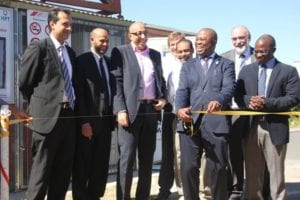The Department of Science and Technology (DST) has officially launched the innovative 2.5 kW hydrogen fuel cell power generator prototype unit at the University of the Western Cape (UWC).
The generator demonstrates South Africa’s innovative capabilities in the emerging hydrogen and fuel cell technologies space. “This prototype was developed by the HySA Systems Integration and Technology Validation Centre of Competence (HySA Systems) in collaboration with Hot Platinum (Pty Ltd), a local company involved in power management and control electronics,” the department said on Tuesday. The partners have been testing the unit at the Cape Flats Nature Reserve, on the UWC campus in Bellville, with remarkable results, the department said. All electrical power used in the reserve is generated from a bank of hydrogen cylinders, instead of from the national grid. The cylinders release hydrogen in the presence of a platinum catalyst (mined in the North West) and a series of proton exchange membranes.Director-General of department, Dr Phil Mjwara, emphasised the critical role of science, technology and innovation in the development of the country. “We talk a lot about adding value and reducing our carbon footprint, about access for all, creating wealth and developing private/public partnerships. This project shows that we are capable of all these things,” he said. The hydrogen fuel cell power generator unit uses hydrogen to generate electrical power, with water vapour the only by-product, which means that electricity can be produced in an environmentally friendly way without pollution or noise.
Furthermore, hydrogen can be used to produce electricity in remote areas that do not have access to the national grid.
The decentralisation of energy generation by using hydrogen fuel cell systems is one of the few possibilities for providing efficient and cost-effective access to electricity. Prof. Bruno Pollet, Director of HySA Systems, said: “The South African government has rolled out several energy and energy-efficiency programmes and initiatives, such as HySA, with an emphasis on alternative energy opportunities and off-grid renewable energy solutions.” South Africa is one of the primary suppliers of platinum group metals to the world, but not much beneficiation is being done in the country. However, the rise of hydrogen fuel cell technologies in various markets is about to change the global platinum landscape with the anticipated increase in platinum usage in this emerging market. It is therefore safe to assume that if the technology gains market share in coming years, as is anticipated by manufacturers such as Toyota, Hyundai, Honda and BMW, the platinum group metal market will see profound and sustained growth. Prof Pollet said there were significant opportunities for South Africa to partner with international fuel cell producers, and that these partnerships had the potential to make the country an established hub for the production of fuel cell components.







